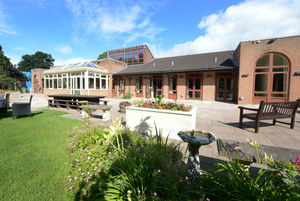Star comment: Never take brilliant local hospices for granted
It is self evident that the National Health Service is under enormous pressure.

But just imagine how bad things would be were in not for charitable efforts which complement its work.
The Severn Hospice is one such. It is a local charity, a people's charity if you will, as it got off the ground thanks to the generosity of Salopians and continues to look to their fundraising to do its wonderful work.
There is, then, a really close bond between the hospice and the community of Shropshire and Mid Wales which it serves.
Since it first opened in 1989, it has cared for approaching 30,000 people.
It is difficult to conceive now how local people once did without it.
The enormous fundraising support which came for the establishment of the original building at Shrewsbury, and then the expansion to Telford, is an indication that folk knew full well what they were missing, and the value this local hospice would bring.
The same applies for the Hope House children's hospice at Morda, near Oswestry - another charity created and sustained on a wave of public enthusiasm, generosity, and support.
The air ambulance, too, is a service regarded as essential which depends on public fundraising, as opposed to public taxation.
Such a model has its pros and cons.
The pressure is always on to keep raising the money, but then again, not being funded by taxes means no government can impose cuts on such services to "save public money."
The need for them will never go away, and their work will never stop, so long as the public support continues.
Every year supporters of the Severn Hospice raise millions. Things do not stand still, however, and the charity is spending £4 million on new buildings as it reshapes the way it delivers its services for the future.
Because there are things about the hospice which may surprise you. Out of every 10 patients it looks after, eight are cared for at home.
Not, then, just a place where people spend their final days.
Instead, support is tailored to their needs and circumstances, with home visits, and if there is a crisis, under the new regime hospice nurses will increasingly be able to provide treatment in the home, meaning the patients do not have to be admitted to hospital.
Apart from all the other benefits of that approach, just think how much it saves the NHS.
You often hear families singing the praises of the work of Shropshire's hospices.
They are treasures to be cherished and supported, and should never be taken for granted.





